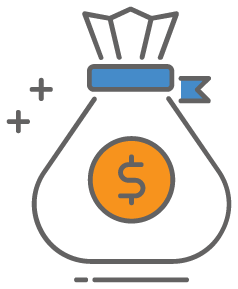
The average American writes fewer checks, but business barons continue the accounting tradition with rental receipts, banking bills, and countersigned contracts. Larger businesses use lockbox services to organize their checks and accounts receivable. If you’re a new business owner you may be wondering what is a lockbox or are curious as to how one works. Since lockbox banking is beneficial to businesses of all sizes and can be modified for personal use, it should be explained in detail.
While checks are more relevant in the United States than in other major economies—such as France, Canada, and Singapore—there’s no doubt there’s been a steady decline in check use over the past decade.[1]Atlanta Federal Reserve. “Global Data Tracks Decade-Long Decline in Check Payments“Accessed December 7, 2023. However, there are still many businesses relying on check payments from customers, especially in the B2B sector. Given how few businesses are accustomed to accepting check payments, receiving and processing checks time-efficiently can be challenging.
A lockbox may be a perfect solution if your business is seeking a more convenient option for accepting customer check payments. With a lockbox, customers from other areas of the country can leave checks in a secure box or send them to the box’s mailing address; your banking partner will collect the checks and deposit them in your bank account automatically. While many consumers may no longer remember lockboxes, they’re still a critical part of B2B payments—JP Morgan recently announced it continues to invest significantly in its nationwide lockbox service.[2]JP Morgan. “The check is dead, long live the check“Accessed 12/7/2023.
What Is a Lockbox?
A lockbox is a secure dropoff box for checks and cash payments—it’s a payment method, sometimes used in a retail setting, to expedite B2B transactions. When a business’s customer drops off a payment at a lockbox location, the checks or cash are securely transferred to a local bank branch to be digitized and processed. This tool is for businesses with customers in various regions around the country. Lockboxes ensure customers have a local dropoff point for physical payments.
Lockbox services are silent butlers for businesses. They provide a secure mailbox where customers send or drop off their payments. The butler or service retrieves these payments, processes them swiftly, and delivers the funds to the business. This discreet arrangement helps companies manage their finances efficiently while keeping their cash flow steady without chasing after payments.

How Does Lockbox Banking Work?
Lockboxes are usually serviced by banks. A business’s bank will collect the lockbox payments and process them locally, speeding up the payment processing timeline. For example, if your business is located in Los Angeles, but you have several clients in New York City, you may have a lockbox in New York City to speed up accepting checks and cash payments. Your New York City clients can physically drop off checks or cash at the lockbox or mail payments directly to the lockbox’s address.
Once the physical payment is deposited in the lockbox, your business’s banking partner will collect the payment in New York City, process it at a local branch, and deposit it in your business banking account. For businesses dealing with a high volume of B2B transactions, a lockbox ensures physical payments are easily processed, organized, and managed. All lockbox payments are digitized, for example, scans are taken of checks and recorded, making it much simpler to reconcile accounts and track payments.
Lockbox vs Safety Deposit Box vs P.O. Box
Many business owners make the mistake of equating lockboxes to safety deposit boxes and P.O. boxes. So, how do they differ?

A lockbox is a secure, business-specific mailbox used for receiving payments and documents. It’s managed by a financial institution for quick processing. In contrast, a P.O. box is a generic postal address provided by the post office, mainly for receiving mail and packages. Lockboxes are tailored for businesses to streamline payment processing, while P.O. boxes are general mailing addresses often used for personal or small-scale mail collection. A safety deposit box, on the other hand, is a secure storage compartment in a bank vault or financial institution primarily used for storing valuable items and documents. Safety deposit boxes are for safeguarding items, not for processing payments.
Types of Lockbox Banking Services
There are two primary types of lockbox banking services offered to businesses:

Retail Lockbox Banking Services
Retail lockboxes offer services to businesses with a high volume of consumer payments. They involve the bank processing individual checks and payments received via mail, streamlining the handling of a large number of small transactions.

Wholesale Lockbox Banking Services
Wholesale lockbox services, on the other hand, cater to businesses receiving payments from other businesses or institutions. These payments are typically larger and come with detailed remittance information. Wholesale lockbox services focus on processing higher-value transactions efficiently.
Benefits of Lockbox Banking
Let’s explore the advantages of using lockboxes to accept payments from customers:

Convenience for Customers
If your customers prefer to pay with cash or checks but aren’t able to visit your business’s physical location, a lockbox offers extra convenience. With a lockbox, customers can physically drop off payments or send payments to the lockbox’s address. Either way, it makes paying using a check or cash much easier!

Faster Payment Processing Timelines
Banks collect and process the checks and cash inside a lockbox, so the payment processing timeline is often much quicker. A business’s banking partner collects the payments in the lockbox, transports them to a local branch, and processes them immediately. By reducing the need for businesses to bring checks and cash to a branch manually, lockboxes speed up the time it takes for payments to clear.

Prevents Slow Mail from Hampering Regional Businesses
Even if a business isn’t setting up multiple lockboxes around the country, a single lockbox is useful if the business is located in a rural area. With some rural areas in a country suffering from slow mail, a lockbox ensures there is a mailing address in an efficient mailing region such as a major city with frequent mail deliveries.
Risks of Lockbox Banking
While lockbox banking helps businesses unlock secure check and cash payments, there are some downsides. Let’s explore the disadvantages of lockbox banking below:

Additional Payment Processing Costs
If a business is accepting a large volume of transactions, especially high-value transactions requiring extra security, then prices will increase. If you run a business with low margins, you must consider whether lockbox deposits are cost-effective. Many businesses are pushing their customers to pay online to reduce the cost of accepting payments.

Security Risks
Lockboxes expose checks, cash, and other personal details to additional employees at your banking partner. It’s critical to work with a bank offering excellent security features and protocols to avoid potential scams.
While lockboxes make physical payments more convenient, there’s no denying online transactions are much smoother. It’s now possible to accept B2B payments using online credit card gateways, digital invoices, and more. While lockboxes are faster than manually accepting cash and checks yourself, digital payments are much quicker than either option. However, with most online retailers reporting an increase in chargeback volumes in recent years, online payment processing also has its risks.[3] “Managing Chargebacks“Accessed December 7, 2023.
How Much Do Lockbox Services Cost?
The cost of a lockbox service varies significantly depending on a range of factors, including location, payment volume, payment value, payment type (cash or check), and the number of lockboxes. As mentioned previously, if you accept high-value cash payments, the price of a lockbox can markedly increase. High-value transactions have extra security concerns therefore they’re more expensive.
Common pricing components include a setup fee, monthly maintenance fees, and per-transaction fees. Retail lockbox fees are typically lower due to a higher transaction volume. Wholesale lockbox services are often more expensive due to their specialized nature and the complexity of handling business-to-business transactions. Banks may also charge for additional services such as image storage or custom reporting. Negotiating pricing with your bank can help control lockbox costs.
Is a Lockbox Right for Your Business?
So, what is a lockbox and is it right for your business? They’re banking tools that improve efficiency and convenience for many business owners in the United States. However, whether this payment option is relevant to your business will depend on the preferred payment methods of your customers and where they’re located. In most cases, a lockbox payment service is part of a business’s omnichannel payment approach, which will also include online credit card payments, digital invoices, bank transfers, in-person payments, and more.
The best way to determine if a lockbox is right for your business is to speak with a merchant service provider. Merchant service providers have unique insights and expertise regarding the best payment options for individual companies. By leveraging the knowledge of a payment expert, your business can determine if a lockbox is a suitable payment channel in terms of cost, convenience, and relevance to your customers.
Lockbox Banking FAQs
Are lockboxes only for checks?
No, lockboxes are also for cash payments. However, cash payments may require extra security and fees due to the security risks they pose. You cannot accept credit card payments via a lockbox.
What businesses stand to benefit the most from lockbox services?
There are three types of businesses positioned to benefit from lockboxes the most: businesses in rural areas, businesses with customers in various regions across the country, and businesses receiving large numbers of checks and cash payments. These types of businesses can streamline check and cash payment processing by outsourcing it to a lockbox banking partner, improving efficiency and reducing the risk of payment delays or errors.
What is a digital lockbox?
A digital lockbox is simply a digital payment gateway. As digital payments, such as credit card transactions and online invoices, continue to grow in popularity, many businesses use payment gateways to accept payments instead of lockboxes.
How can a business reconcile lockbox transactions?
Lockboxes simplify the process of reconciling transactions. Your banking partner will digitally record each payment and upload it to your banking portal. Your business can use the information provided by the bank to reconcile accounts.







